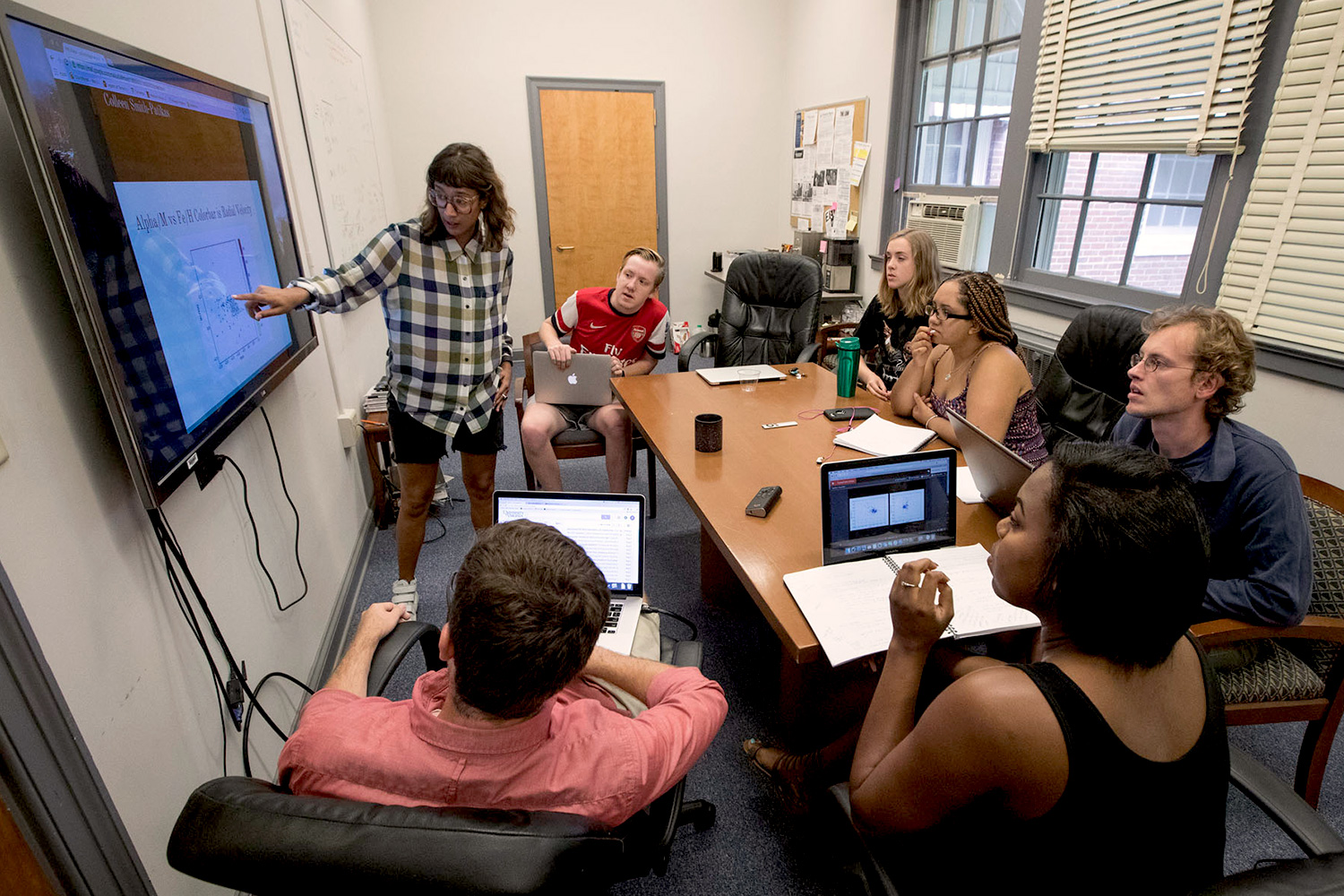An explanation of Donovan White’s research in nuclear particle physics may be hard to follow for those who don’t have the expertise, but his enthusiasm comes through loud and clear.
“This opportunity provided me with a clear understanding of how engineers and scientists think in real time, analyze and perform,” wrote White, a Morehouse College student, about the new University of Virginia summer research program for under-represented students that brought him to the Grounds this summer. “The experience is immeasurable.”
White is one of about 20 minority students from colleges and universities participating in an unprecedented collaboration between UVA programs that include the Leadership Alliance, the Virginia-North Carolina Alliance and an astronomy professor’s grant. The coordinators pooled resources to provide a spectrum of experiences in science, technology, engineering and mathematics fields for under-represented undergraduates, from hands-on work in a laboratory to presenting at a national conference in Connecticut.
The experience is immeasurable.” -- Donovan White, Visiting Morehouse College student
“Research has demonstrated that undergraduate research opportunities are essential preparation for students pursuing graduate school in STEM,” said Kristin L. Morgan of UVA’s Office for Diversity & Equity, which coordinates the VA-NC Alliance of nine colleges and universities that is hosting its seventh cohort of summer researchers on Grounds.
White came to UVA thanks to the Leadership Alliance, a national group devoted to increasing the minority population in academia and the workforce. Keisha John, director of diversity programs in UVA’s Office of Graduate and Postdoctoral Affairs, brought the Leadership Alliance’s First Year Research Experience program to the University. Seven students who completed their first undergraduate year at minority-serving institutions as far away as Washington state have participated, conducting research with chemistry or physics professors.
John said the diversification of STEM fields is of national import, given the nation’s changing demographics, and she’d like UVA to be seen as place students can come and receive the best training.
“It’s about where we stand as a country – by 2020, the population of U.S. children who are minorities will surpass the majority-white population,” she said. “If we don’t prepare under-represented students, we’ll lose this valuable resource in our people to contribute to scientific innovation.
“It is our hope that these students consider UVA for graduate school. Therefore, robust and collaborative programming is needed as it ensures the students have an enriching experience.”
She pointed out that most of the students may find in the near future that they’re the only, or one of just a few, under-represented minorities in their laboratory group, but in these summer research programs “seeing and interacting with other students with similar backgrounds and future interests provides a support network, as well as a potential vision of their future cohort in graduate school and the workforce.”
Assistant Professor of Astronomy Nitya Jacob Kallivayalil started a five-year collaboration with Spelman College, the nation’s oldest historically black college for women in Atlanta, as part of the NSF Early Career Development Award she received last year.
“I hope to attract some of these great physics majors at Spelman to go into astronomy graduate school,” she said.
“The intense curiosity that the students brought to work every day really exceeded my already high expectations, and to see them develop their passion for the endeavor of science has been truly exciting,” said Kallivayalil, who had three students working in her lab on the structure and dynamics of galaxies.
Spelman student Colleen Smith-Patikas said she not only enjoyed research, but has realized a new passion. She is definitely considering graduate school, an option she hadn’t considered before.
“I’d never taken a chemistry or astronomy class, but to combine both and realize that I truly enjoy what I was researching was a pleasure,” she said.
The research program was also transformative for Brandon Berk, a rising sophomore who came across the country from Heritage University in Toppenish, Washington, located on the Yakama Indian Reservation. He said the program has given him incredible experience, along with the adventure of visiting Virginia for the first time.
“The program has greatly helped me to see what graduate school entails and what graduate-level research involves,” he wrote in an email. “Coming into the program, I was unsure if grad school was right for me, but now in the last week of the program, I can honestly say that grad school will definitely be my choice after I receive my undergraduate degree, and getting a Ph.D. will be my ultimate goal.”
Berk worked with Assistant Professor of Chemistry Robin Garrod, who had him doing “real science,” he said.
“Having Brandon come and work with me and my group has been a lot of fun, and it has allowed us to move ahead with a project that simply would not have gotten done otherwise – this is real science, even if it’s just a small project in a larger overall scheme,” Garrod said. “But in fact I am expecting that the work Brandon has done will make its way into a publication, probably as a stand-alone work, in collaboration with one of my grad students, Aspen Clements.”
John said these summer research programs are important for UVA faculty as well.
“Programs such as these provide our faculty exposure to under-represented students and their potential, as well as put us on the map as being a place that advocates for and supports diversity,” she said.
Media Contact
Article Information
August 10, 2016
/content/immeasurable-experience-minority-students-rave-about-science-research

